 Technology peripherals
Technology peripherals
 AI
AI
 New MIT research shows that the cost of replacing human labor with AI is high, and only 23% of vision jobs can be replaced
New MIT research shows that the cost of replacing human labor with AI is high, and only 23% of vision jobs can be replaced
New MIT research shows that the cost of replacing human labor with AI is high, and only 23% of vision jobs can be replaced
Will artificial intelligence take away our jobs? If you watch Silicon Valley executives talk about today's cutting-edge AI technology every day, you might think the answer is yes, and it will happen soon.
However, recent research from the MIT Computer Science and Artificial Intelligence Laboratory (CSAIL) shows that visual AI still cannot completely replace humans, which gives us some comfort.
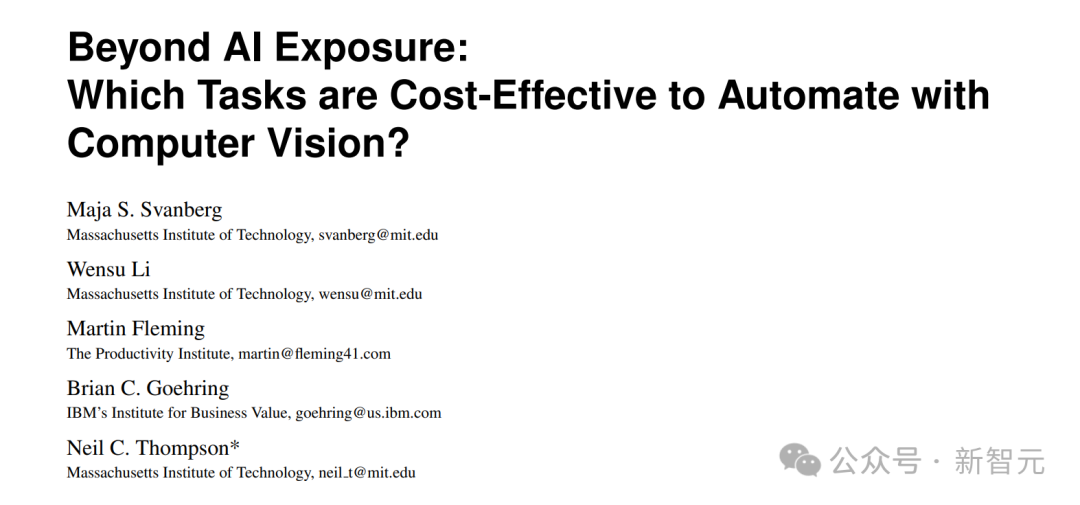
Paper address: https://futuretech-site.s3.us-east-2.amazonaws.com/2024-01-18 Beyond_AI_Exposure .pdf
Research shows that the pace of workforce automation may be much slower than we think.
Because - they are too expensive!
Visual tasks, AI is much more expensive than artificial intelligence
Researchers at MIT not only explored AI’s ability to perform tasks, but also Examined whether companies could replace humans in these tasks within the broader labor market and whether this would be economically beneficial.
Study found that while computer vision can already automate tasks that account for 1.6% of workers’ wages in the U.S. economy (excluding agriculture), only 23% of tasks that account for the entire economy’s wages 0.4%) are more cost-effective in terms of automation.
Moreover, the problem with visual AI is not only the small percentage, but more importantly, the cost is too high.
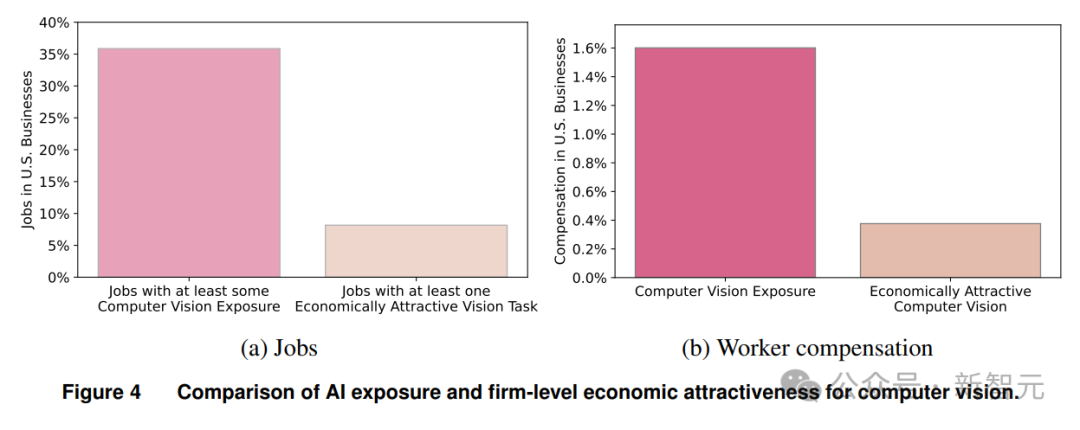
In the vast majority of cases, labor costs are cheaper than using automation.
Overall, the research results show that the scale of job losses caused by AI is huge, but this process is also gradual, so the government has room for restructuring policies and retraining to mitigate Effects of unemployment. ”
Scholars have studied tasks such as analyzing images of hospital diagnostic equipment, or checking whether a tray contains the correct items, which are visual tasks that can be achieved with today’s AI.

#But the authors point out that such tasks are often so scattered that automating them is simply not an economic consideration.
Although AI will bring some changes to the labor market, there is always time to adapt to it. They don't happen so fast that everything immediately goes into chaos.
Of course, this research only focuses on CV systems (systems that can identify and classify objects in images and videos), not more flexible systems such as GPT-4. Modal large language model.
OpenAI’s previous research shows that 19% of American workers feel affected by AI of the level GPT-4 in 50% of their work tasks.

This number is much higher than the MIT Research Institute's research on CV.
So, are MIT’s research results applicable to more general AI tools? It's still unknown.
MIT researchers have found that it can be prohibitively expensive for companies to "fine-tune" CV systems to make them suitable for specific specialized tasks.
Although such an investment may make sense for a large company, for a small company, it is not as cost-effective as a well-trained worker.
The key reason is that it does not mean that AI can complete a task, it is economically feasible.
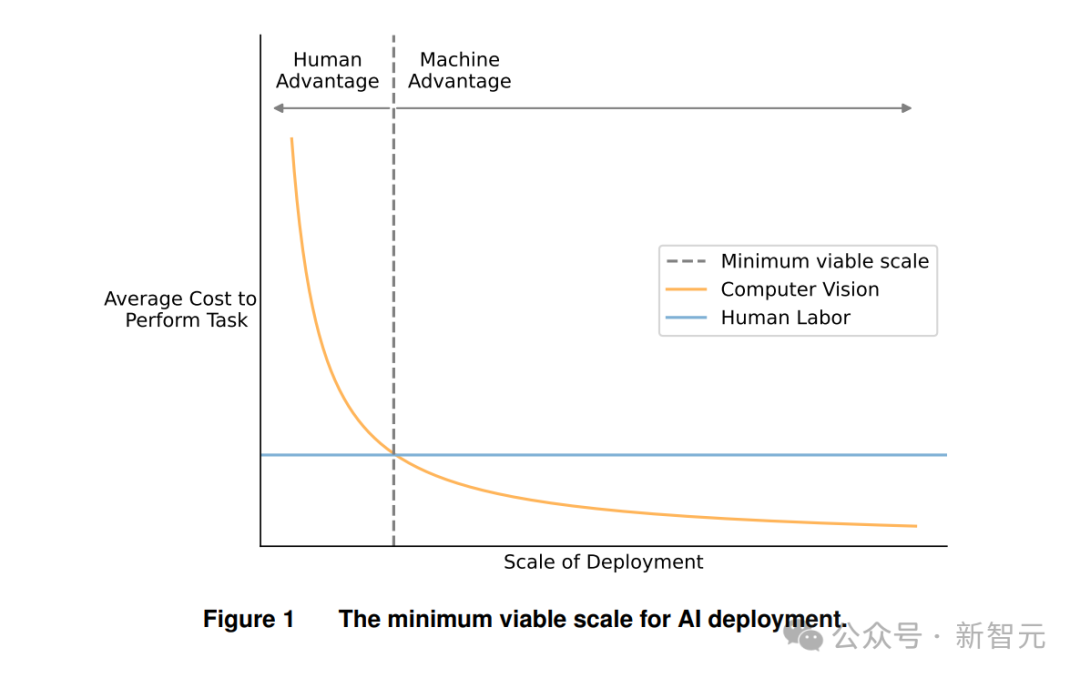
In order to "fine-tune" the computer vision model, such as distinguishing specific types of pill bottles to achieve 99.9% accuracy, we need to collect Labeling images of a large number of different drugs is an expensive and cumbersome process, even if workers with low wages can be hired to complete the work cheaply.
Because then, we have to pay the massive computational cost of fine-tuning the AI model on massive data storage.
Can GPT-4 replace humans? Maybe it will be faster
But it is not clear yet that large language models also fit this situation.
However, fine-tuning a cutting-edge LLM to perform a specific task may only require a detailed list of written rules, which will be much easier than fine-tuning a CV model.
A study by OpenAI last August found that GPT-4 could effectively perform content moderation tasks when fine-tuned using detailed policy documents and several examples of tokens.
These findings suggest that large language models can be applied to a wider range of socioeconomic tasks faster and cheaper than computer vision models.
Currently, the fine-tuning of GPT-4 remains in restricted test mode, as OpenAI does not want to encounter any major security challenges.
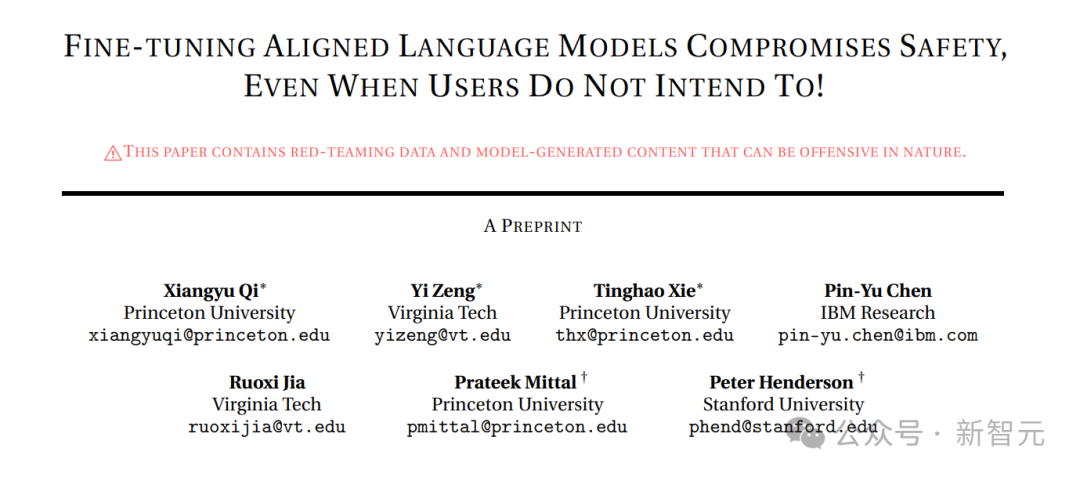 Paper address: https://llm-tuning-safety.github.io/
Paper address: https://llm-tuning-safety.github.io/
But with OpenAI and its Competitors are starting to allow customers to fine-tune models, and levels of automation may be achieved much faster than predicted in the MIT study.
In this regard, MIT researcher Thompson said -
"Of course, customizing LLM may be easier than customizing a computer vision system, so it will Greater adoption in economic practice.
#However, as long as the practice requires a small engineering team to integrate the system into the company's workflow, cost will still be a factor that cannot be ignored .”
It’s still far away from AI replacing us
For many companies, visual automation is not economically attractive. And this will continue for a long time.
MIT research points out that the cost of fine-tuning AI systems for specific tasks is too high, which is not cost-effective for small businesses.
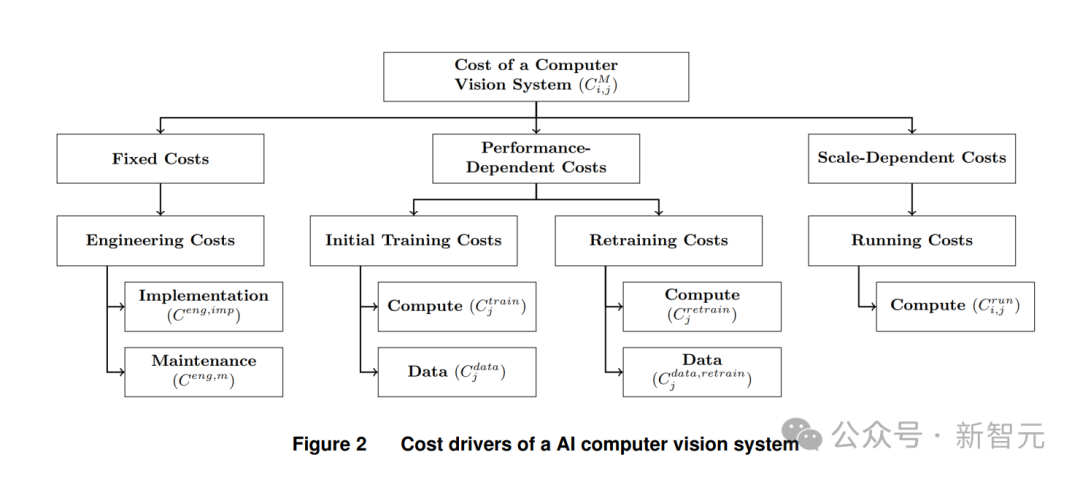
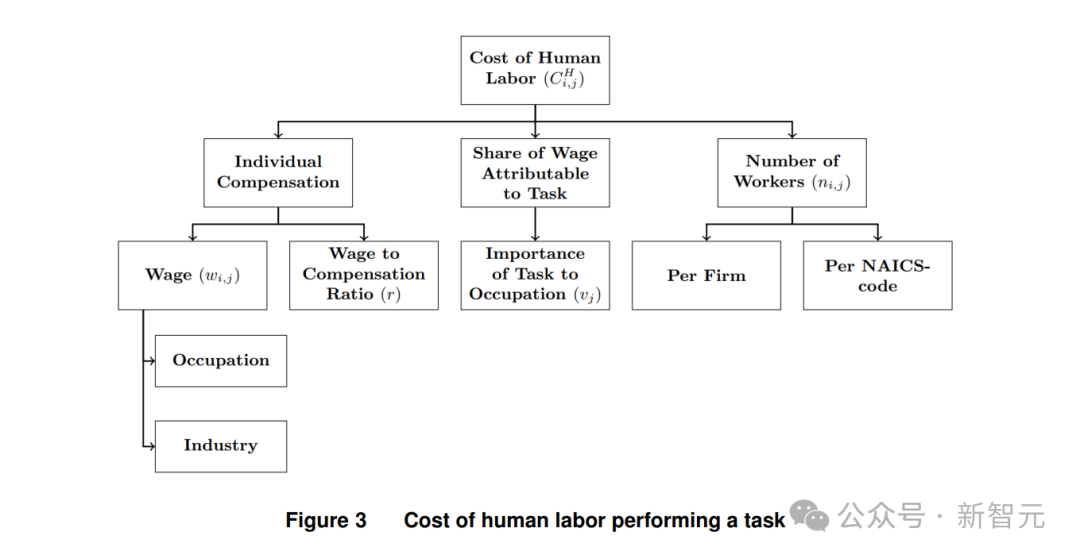
For example, in a bakery, although the AI system can be used for food quality control (The time used accounts for 6% of the bakery’s working hours), but the high investment and maintenance costs of the equipment directly exceed the savings it can save.
In an interview with Time magazine, lead author Neil Thompson emphasized that although AI has the potential to have a significant impact on the job market, this day is still far away.
Now, the transition to automation through AI is not imminent, so it will not cause any panic and confusion. Policymakers also have an opportunity to take measures such as retraining.
Therefore, this article points out a key issue: Although many AI technologies have made people feel a sense of crisis, only by significantly reducing the deployment cost of AI and greatly expanding the scope of AI applications can we Only in this way can automation be more attractive to enterprises.
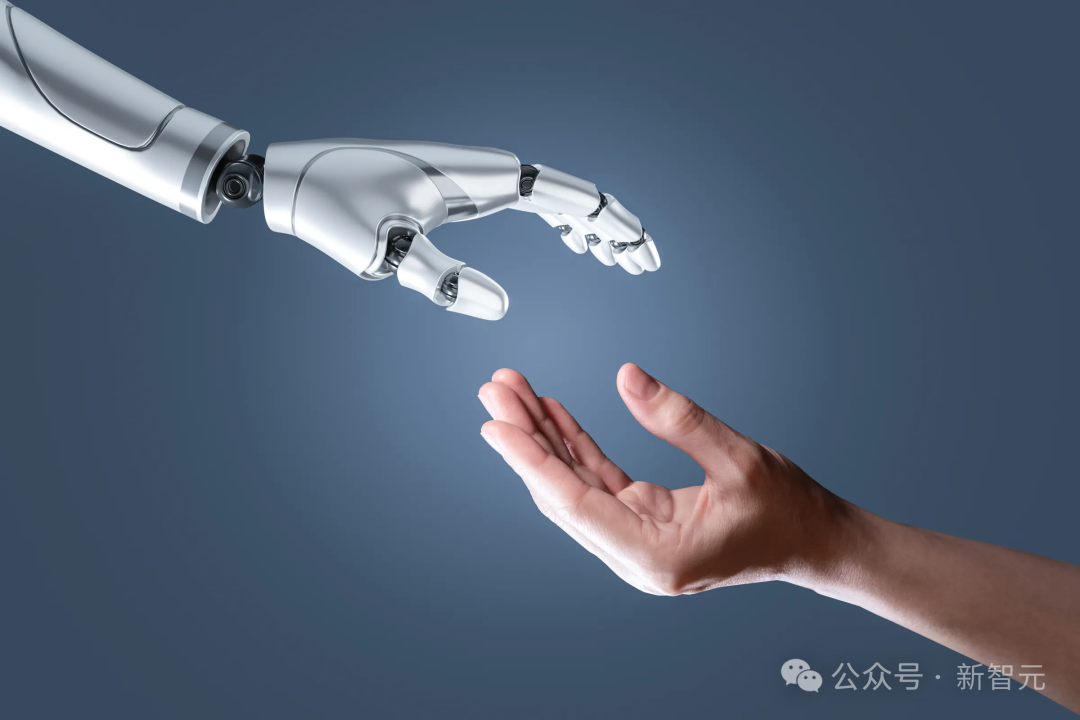
Antonin Bergeaud, associate professor of economics at HEC Paris, said that many scholars have now written articles like this to explore the impact of AI on the future labor market. , they use mostly publicly available metrics.
However, these estimates incorrectly rely on the assumption that if a job can be automated, it will be automated.
Bergeaud said that the research by these MIT scholars adopted a new perspective and carefully estimated the cost of implementing this technology, including the process from installation to maintenance.
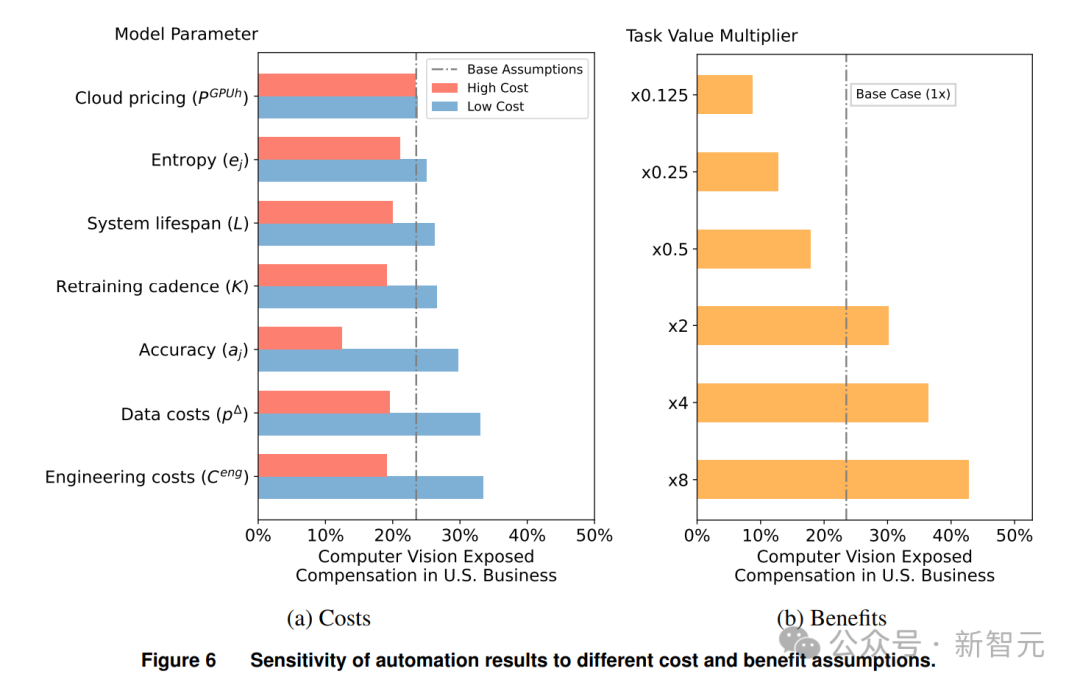
Compared with the current labor costs in the United States, even if an artificial intelligence system is only as good as a human being, it is often very difficult to adopt it. expensive.
Therefore, the conclusion drawn from this study is also surprising. The proportion of the labor market facing the risk of automation is much smaller than we imagined.
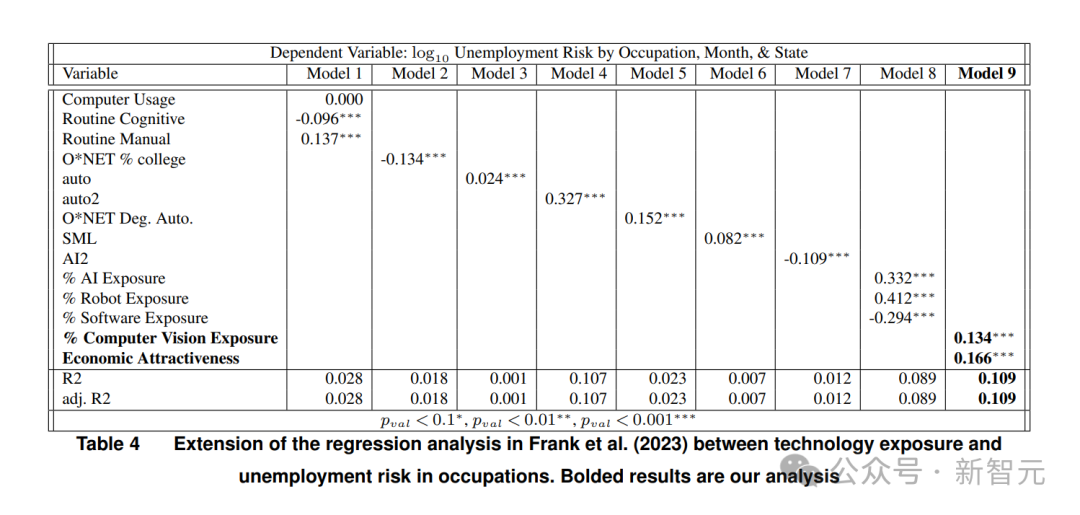
Of course, there is a reason why AI causes so many people’s unemployment anxiety.
DeepMind Lianchuang warns: Within a few years, AI will impact the labor market
DeepMind co-founder Mustafa Suleyman previously warned that in the long run It seems that artificial intelligence is a tool that "fundamentally replaces labor."

Suleyman said at the World Economic Forum annual meeting, “We must seriously think about how to integrate these tools (AI). If we completely let the market dominate, Fundamentally, these tools will replace labor."
Current artificial intelligence mainly does two things:
The first is to improve It improves the efficiency of existing businesses and saves companies a lot of costs, but at the cost of replacing humans doing related work; secondly, it creates new businesses and processes, which actually contains opportunities to create jobs.
In the next few years, these two forces will have a huge impact on the labor market and cause unpredictable effects.
For more than a decade, experts have debated whether artificial intelligence will replace human workers.
Carl Benedikt Frey and Michael Osborne estimated in a 2013 study that 47% of U.S. jobs could be automated by the mid-2030s in the artificial intelligence boom.
A July McKinsey study found that nearly 12 million Americans will need to change jobs by 2030 as artificial intelligence replaces their roles.
In fact, Suleyman is not the only one who has warned against this.
In a Wired article published on January 10, MIT professor Daron Acemoglu predicted that artificial intelligence will disappoint everyone by 2024, proving that it is just A kind of “universal automation” in which AI will take away workers’ jobs but fail to achieve the expected dramatic gains in productivity.

“Everything of value in our world is created by our intelligence, our ability to reason about and predict information. And AI can do exactly that."
AI will start its own company within five years
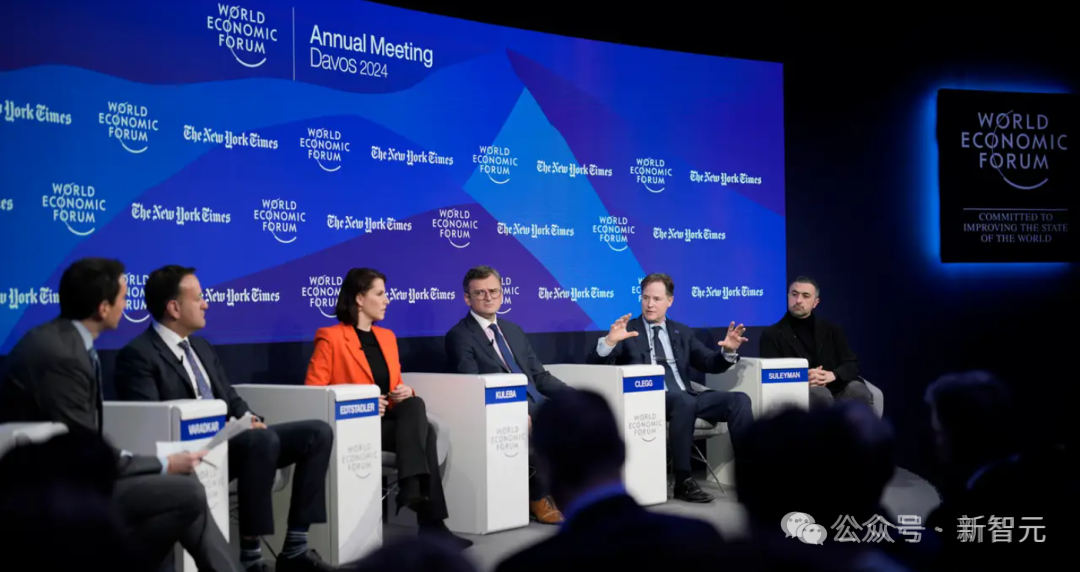
In a previous panel discussion on artificial intelligence at the World Economic Forum, Suleyman was asked when AI would be able to pass the Turing test and even demonstrate human-like capabilities (AGI).
Suleyman said that the modern version of the Turing Test should be to evaluate whether AI can have the ability to manufacture and market products like entrepreneurs, project managers and inventors.
"I'm pretty sure that in the next five years, AI will not only have these capabilities, but these capabilities will be widely available at a very cheap price, and may even be open source, and this It will completely change the economy."
IMF Chairman’s voice: 40% of global jobs are affected by AI, but it is also a huge opportunity
And facing The International Monetary Fund also stated in its latest report that due to the impact of AI, nearly 40% of global employment will be affected.
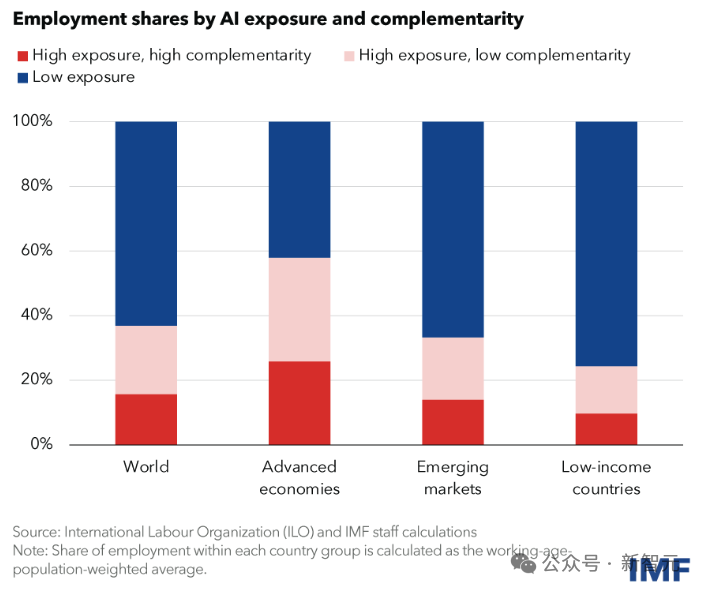
Among them, 60% of jobs in developed economies will be affected, and in emerging markets and countries, this number is about 40%. In low-income countries, this dropped to 26%.
Among the jobs affected by AI, half will be negatively affected, and some will even disappear completely.
For the other half of the jobs, AI will bring more improvements in efficiency, and the income levels of workers who can embrace AI as soon as possible will also increase accordingly.
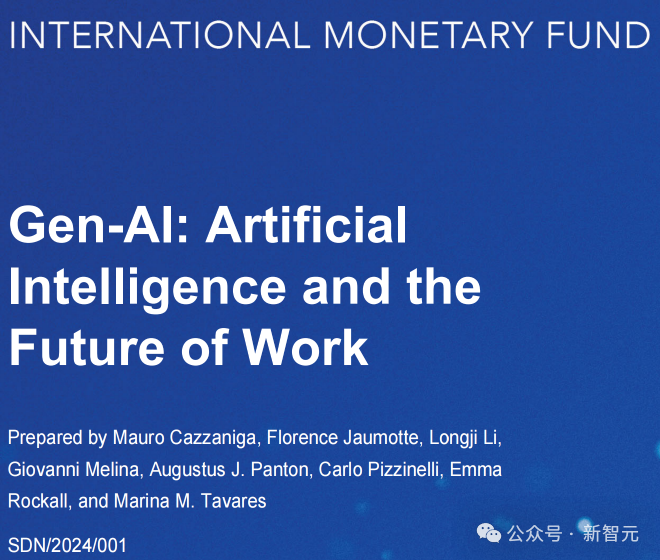
# Specifically, research shows that AI can help less experienced workers become more productive faster. Younger workers may find opportunities easier to take advantage of, while older workers may struggle to adapt.
If a similar situation develops further, it will soon polarize incomes: workers who can take full advantage of artificial intelligence will see increased productivity and wages, while those who cannot take advantage of artificial intelligence will see an increase in productivity and wages. For workers, productivity and income will drop significantly.
When this situation is mapped to the labor market, it will further intensify this differentiation: many jobs affected by AI technology will disappear, while the income of new jobs created by AI technology will Because of the scarcity of personnel, income will be relatively high.
This kind of macro judgment corresponds to developers and the AI industry. An obvious reality is that developers are becoming more and more worried about their career prospects.
Especially for developers who are new to the industry, because their work is relatively easy to be automated by AI technology, their labor demand will be reduced, and their income will also be affected.
But for algorithm engineers who develop AI technology, as well as many positions that will emerge with the Gen AI wave, their income and labor demand will continue to rise.
In response to the content of this report, Kristalina Georgieva, Chairman of the International Monetary Fund, said, "Artificial intelligence is indeed scary, but it is also a huge opportunity for everyone."

#And the IMF chairman’s statement was also hotly searched by netizens on Zhihu.
Indeed, it is difficult to reach a consensus on the impact of AI on employment and the labor market in a short period of time.
The above is the detailed content of New MIT research shows that the cost of replacing human labor with AI is high, and only 23% of vision jobs can be replaced. For more information, please follow other related articles on the PHP Chinese website!

Hot AI Tools

Undresser.AI Undress
AI-powered app for creating realistic nude photos

AI Clothes Remover
Online AI tool for removing clothes from photos.

Undress AI Tool
Undress images for free

Clothoff.io
AI clothes remover

AI Hentai Generator
Generate AI Hentai for free.

Hot Article

Hot Tools

Notepad++7.3.1
Easy-to-use and free code editor

SublimeText3 Chinese version
Chinese version, very easy to use

Zend Studio 13.0.1
Powerful PHP integrated development environment

Dreamweaver CS6
Visual web development tools

SublimeText3 Mac version
God-level code editing software (SublimeText3)

Hot Topics
 Open source! Beyond ZoeDepth! DepthFM: Fast and accurate monocular depth estimation!
Apr 03, 2024 pm 12:04 PM
Open source! Beyond ZoeDepth! DepthFM: Fast and accurate monocular depth estimation!
Apr 03, 2024 pm 12:04 PM
0.What does this article do? We propose DepthFM: a versatile and fast state-of-the-art generative monocular depth estimation model. In addition to traditional depth estimation tasks, DepthFM also demonstrates state-of-the-art capabilities in downstream tasks such as depth inpainting. DepthFM is efficient and can synthesize depth maps within a few inference steps. Let’s read about this work together ~ 1. Paper information title: DepthFM: FastMonocularDepthEstimationwithFlowMatching Author: MingGui, JohannesS.Fischer, UlrichPrestel, PingchuanMa, Dmytr
 The world's most powerful open source MoE model is here, with Chinese capabilities comparable to GPT-4, and the price is only nearly one percent of GPT-4-Turbo
May 07, 2024 pm 04:13 PM
The world's most powerful open source MoE model is here, with Chinese capabilities comparable to GPT-4, and the price is only nearly one percent of GPT-4-Turbo
May 07, 2024 pm 04:13 PM
Imagine an artificial intelligence model that not only has the ability to surpass traditional computing, but also achieves more efficient performance at a lower cost. This is not science fiction, DeepSeek-V2[1], the world’s most powerful open source MoE model is here. DeepSeek-V2 is a powerful mixture of experts (MoE) language model with the characteristics of economical training and efficient inference. It consists of 236B parameters, 21B of which are used to activate each marker. Compared with DeepSeek67B, DeepSeek-V2 has stronger performance, while saving 42.5% of training costs, reducing KV cache by 93.3%, and increasing the maximum generation throughput to 5.76 times. DeepSeek is a company exploring general artificial intelligence
 KAN, which replaces MLP, has been extended to convolution by open source projects
Jun 01, 2024 pm 10:03 PM
KAN, which replaces MLP, has been extended to convolution by open source projects
Jun 01, 2024 pm 10:03 PM
Earlier this month, researchers from MIT and other institutions proposed a very promising alternative to MLP - KAN. KAN outperforms MLP in terms of accuracy and interpretability. And it can outperform MLP running with a larger number of parameters with a very small number of parameters. For example, the authors stated that they used KAN to reproduce DeepMind's results with a smaller network and a higher degree of automation. Specifically, DeepMind's MLP has about 300,000 parameters, while KAN only has about 200 parameters. KAN has a strong mathematical foundation like MLP. MLP is based on the universal approximation theorem, while KAN is based on the Kolmogorov-Arnold representation theorem. As shown in the figure below, KAN has
 Hello, electric Atlas! Boston Dynamics robot comes back to life, 180-degree weird moves scare Musk
Apr 18, 2024 pm 07:58 PM
Hello, electric Atlas! Boston Dynamics robot comes back to life, 180-degree weird moves scare Musk
Apr 18, 2024 pm 07:58 PM
Boston Dynamics Atlas officially enters the era of electric robots! Yesterday, the hydraulic Atlas just "tearfully" withdrew from the stage of history. Today, Boston Dynamics announced that the electric Atlas is on the job. It seems that in the field of commercial humanoid robots, Boston Dynamics is determined to compete with Tesla. After the new video was released, it had already been viewed by more than one million people in just ten hours. The old people leave and new roles appear. This is a historical necessity. There is no doubt that this year is the explosive year of humanoid robots. Netizens commented: The advancement of robots has made this year's opening ceremony look like a human, and the degree of freedom is far greater than that of humans. But is this really not a horror movie? At the beginning of the video, Atlas is lying calmly on the ground, seemingly on his back. What follows is jaw-dropping
 AI subverts mathematical research! Fields Medal winner and Chinese-American mathematician led 11 top-ranked papers | Liked by Terence Tao
Apr 09, 2024 am 11:52 AM
AI subverts mathematical research! Fields Medal winner and Chinese-American mathematician led 11 top-ranked papers | Liked by Terence Tao
Apr 09, 2024 am 11:52 AM
AI is indeed changing mathematics. Recently, Tao Zhexuan, who has been paying close attention to this issue, forwarded the latest issue of "Bulletin of the American Mathematical Society" (Bulletin of the American Mathematical Society). Focusing on the topic "Will machines change mathematics?", many mathematicians expressed their opinions. The whole process was full of sparks, hardcore and exciting. The author has a strong lineup, including Fields Medal winner Akshay Venkatesh, Chinese mathematician Zheng Lejun, NYU computer scientist Ernest Davis and many other well-known scholars in the industry. The world of AI has changed dramatically. You know, many of these articles were submitted a year ago.
 The vitality of super intelligence awakens! But with the arrival of self-updating AI, mothers no longer have to worry about data bottlenecks
Apr 29, 2024 pm 06:55 PM
The vitality of super intelligence awakens! But with the arrival of self-updating AI, mothers no longer have to worry about data bottlenecks
Apr 29, 2024 pm 06:55 PM
I cry to death. The world is madly building big models. The data on the Internet is not enough. It is not enough at all. The training model looks like "The Hunger Games", and AI researchers around the world are worrying about how to feed these data voracious eaters. This problem is particularly prominent in multi-modal tasks. At a time when nothing could be done, a start-up team from the Department of Renmin University of China used its own new model to become the first in China to make "model-generated data feed itself" a reality. Moreover, it is a two-pronged approach on the understanding side and the generation side. Both sides can generate high-quality, multi-modal new data and provide data feedback to the model itself. What is a model? Awaker 1.0, a large multi-modal model that just appeared on the Zhongguancun Forum. Who is the team? Sophon engine. Founded by Gao Yizhao, a doctoral student at Renmin University’s Hillhouse School of Artificial Intelligence.
 Slow Cellular Data Internet Speeds on iPhone: Fixes
May 03, 2024 pm 09:01 PM
Slow Cellular Data Internet Speeds on iPhone: Fixes
May 03, 2024 pm 09:01 PM
Facing lag, slow mobile data connection on iPhone? Typically, the strength of cellular internet on your phone depends on several factors such as region, cellular network type, roaming type, etc. There are some things you can do to get a faster, more reliable cellular Internet connection. Fix 1 – Force Restart iPhone Sometimes, force restarting your device just resets a lot of things, including the cellular connection. Step 1 – Just press the volume up key once and release. Next, press the Volume Down key and release it again. Step 2 – The next part of the process is to hold the button on the right side. Let the iPhone finish restarting. Enable cellular data and check network speed. Check again Fix 2 – Change data mode While 5G offers better network speeds, it works better when the signal is weaker
 The U.S. Air Force showcases its first AI fighter jet with high profile! The minister personally conducted the test drive without interfering during the whole process, and 100,000 lines of code were tested for 21 times.
May 07, 2024 pm 05:00 PM
The U.S. Air Force showcases its first AI fighter jet with high profile! The minister personally conducted the test drive without interfering during the whole process, and 100,000 lines of code were tested for 21 times.
May 07, 2024 pm 05:00 PM
Recently, the military circle has been overwhelmed by the news: US military fighter jets can now complete fully automatic air combat using AI. Yes, just recently, the US military’s AI fighter jet was made public for the first time and the mystery was unveiled. The full name of this fighter is the Variable Stability Simulator Test Aircraft (VISTA). It was personally flown by the Secretary of the US Air Force to simulate a one-on-one air battle. On May 2, U.S. Air Force Secretary Frank Kendall took off in an X-62AVISTA at Edwards Air Force Base. Note that during the one-hour flight, all flight actions were completed autonomously by AI! Kendall said - "For the past few decades, we have been thinking about the unlimited potential of autonomous air-to-air combat, but it has always seemed out of reach." However now,





